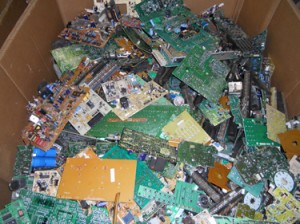 The University of Mississippi has partnered with Magnolia Data Solutions to recycle its electronic waste, which ranges from computers to cell phones and digital cameras. Recycling electronics is important because that technology contains toxins that can have adverse effects on the environment, said Christopher Lumaghini, owner of the company.
The University of Mississippi has partnered with Magnolia Data Solutions to recycle its electronic waste, which ranges from computers to cell phones and digital cameras. Recycling electronics is important because that technology contains toxins that can have adverse effects on the environment, said Christopher Lumaghini, owner of the company.
With more than 11,000 computers and laptops on the university’s inventory, UM’s actions have a significant impact on its environmental stewardship.
“Based on other programs across the state or even region, Ole Miss has a strong program currently in place, and we are pleased to be working with the university,” Lumaghini said.
Magnolia Data Solutions holds a certification as an R2 recycler, the highest operating standard to which an electronic recycling facility can be accredited, he said. The certification distinguishes companies that highly value environmental and legal compliance, worker health and safety, and facility security. Without this certification, the university would find it almost impossible to verify that the electronics and toxic materials are being handled appropriately and not being shipped to other countries with looser standards.
“R2 certified facilities are audited regularly on more than 50 areas of operational performance and must comply with all components of the standard,” Lumaghini explained. “R2 prohibits the export of electronic waste, eradicating the possibility of illegal dumping of harmful metals in Third World countries. R2 also has strict policies on how a facility handles personal information, which is stored on hard drives.”
Magnolia Data Solutions, established in 2008, receives and processes the electronic waste in Jackson, Miss., at its 30,000-square-foot processing facility.
Lumaghina said that when equipment arrives at the facility, it is weighed and then entered into the company’s track software. From there, the electronics are sorted and de-manufactured by technicians.
“The de-manufacturing process generates wastes, some which hold a negative and some which hold a positive value,” he said. “All of the waste is then sent to the appropriate smelter for final processing.”
The university makes every effort to reuse equipment or transfer it to another state agency before recycling is considered. However, once reuse options have been exhausted, having a certified Mississippi-based recycling company to handle the waste appropriately is a great option. Magnolia Data Solutions collects and processes a wide array of electronics and universal wastes.
“The most common items processed are computers, printers, miscellaneous components, televisions and monitors,” Lumaghini said.
Lumaghini is pleased with the increase in amount of electronics recycled in Mississippi since the company opened in 2008.
“As consumer awareness and corporate responsibility increases, it creates a new level of obsolete or nonworking electronic products to be disposed of properly,” he said.